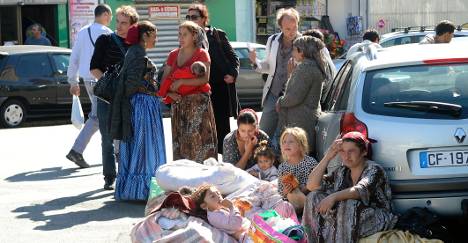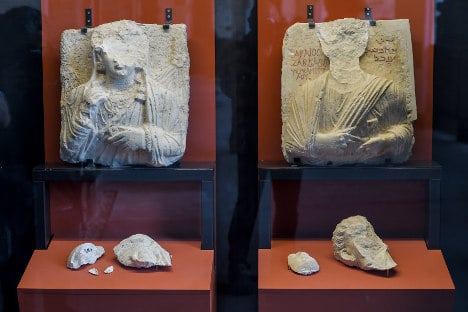The European Commission was forced once again on Wednesday to threaten sanctions against France over its policy towards the Roma community, sending a reminder to Paris that the minority were citizens of the EU and therefore free to go where they want.
“Free movement as freedom to reside in another country are fundamental rights. If these principles enshrined in the treaties are not met, then the commission will use all means at its disposal,” to sanction such violations, warned spokesman Olivier Bailly.
“The Roma, like all EU citizens, enjoy the right to freedom of movement in all EU member states and to reside in a country other than their country of origin,” Bailly added.
This is not the first time Brusels has sent a warning to Paris. Three years ago the Commission's Vice President Viviane Reding sent a similar threat to former president Nicolas Sarkozy that Roma expulsions had to stop.
But camp evictions have continued and even increased under the Socialist government. The Roma question, which is rarely off the political agenda in France flared up again this week, thanks in the main to some inflammatory words by the country's Interior Minister Manuel Valls.
Valls insisted on Wednesday that he stood by a controversial call for tens of thousands of ethnic Roma to be kicked out of France.
Valls has triggered an outcry from human rights groups, the European Commission and some of his government colleagues by saying any Roma not working should be "delivered back to the borders", describing their way of life as "extremely different from ours," and claiming they will never integrate into French society.
The latter remark earned the minister a rebuke from his cabinet colleague, Arnaud Montebourg, who pointedly alluded to Valls' own status as the Barcelona-born son of Spanish immigrants who left for France during Franco's dictatorship.
"A theory that such and such a person or such and such a people will never, ever be able to integrate just doesn't stand up," Montebourg said.
"That's what they said about the Italians, that's what they said about the Spanish, it's what they said about the Portuguese, and what they said about the Arabs.
"Decreeing in advance that it is impossible seems to me excessive and is worthy of being corrected."
Valls hit back: "I've got nothing to correct. My remarks only shock those who don't know the subject."
He then repeated remarks that Amnesty International described as likely to "perpetuate stereotypes and encourage animosity" towards the 20,000 plus Roma currently living in France in makeshift camps.
"The majority (of Roma) should be delivered back to the borders," Valls said. "We are not here to welcome these people. I'd remind you of (former Socialist premier) Michel Rocard's statement: It's not France's job to deal with the misery of the whole world."
On Tuesday he had claimed the Roma in France had no interest in integrating, reiterating previous assertions that most of them were at the mercy of begging and prostitution networks.
The European Commission has repeatedly questioned the legality of the government encouraging local councils to systematically dismantle illegal Roma camps and offering the expelled residents free flights and financial incentives to return to their countries of origin, primarily Bulgaria and Romania.
The policy has also been criticised by the UN's human rights arm.
Under pressure from the EU and what the daily Liberation described as the "humanist" wing of the government, Valls agreed last year that Roma camp clearances should not take place without alternative housing plans being put in place first.
But that policy has rarely been applied and 80 percent of the 12,000 Roma expelled from their temporary homes in 2012 were forced to leave, the European Association for the Defence of Human Rights (AEDH) said in a report earlier this year.
Valls maintains that forced evictions are preferable to tolerating squalid, insanitary camps and has defended repatriations as a better alternative than allowing Roma in France to continue working for organised criminal gangs.
But his approach has been criticised as a waste of money by France's public spending watchdog.
Despite thousands of government-financed repatriations, the numbers of Roma in France have remained stable, reflecting the reality that anyone flown back to Romania or Bulgaria can immediately return to France under EU freedom of movement laws.
Don't miss stories like this – join us on Facebook and Twitter.



 Please whitelist us to continue reading.
Please whitelist us to continue reading.
Member comments